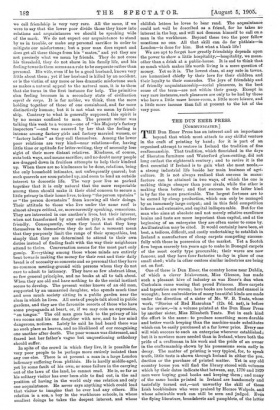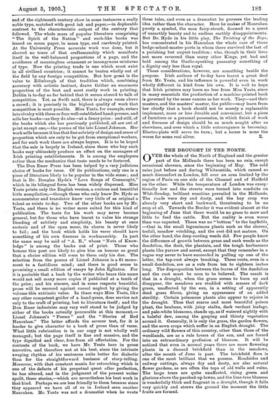T HE Dun Emer Press has an interest and an importance
beyond that which must attach to any skilful venture in the craft of printing by hand ; for it is part of an organised attempt to restore in Ireland the tradition of fine craftsmanship. That tradition, which flourished in the days of Sheraton furniture and Waterford glass-cutting, did not long outlast the eighteenth century ; and to revive it is the first essential if Ireland is to gain what she most needs,— a strong industrial life beside her main business of agri- culture. It is not always realised that success in menu.- facture can be attained in two ways, of which the one is making things cheaper than your rivals, while the other is making them better; and that success in the latter kind is by far the more practicable. The largest fortunes are to be earned by cheap production, which can only be managed by an immensely large output; and in this field competition is fierce and extensive, and capital indispensable. But for the man who aims at absolute and not merely relative excellence brains and taste are more important than capital, and at the beginning of an enterprise they are often easier to come by. An illustration may be cited. It would certainly have been, at best, a tedious, difficult, and costly undertaking to establish in Ireland a manufacture of cheap carpets competing success- fully with those in possession of the market. Yet a Scotch firm began scarcely ten years ago to make in Donegal carpets of the most costly type procurable; their wares are now famous, and they have four factories to-day in place of one small shed; while in other centres similar industries are being set on foot.
One of these is Dun Emer, the country house near Dublin, of which a clever Irishwoman, Miss Gleeson, has made such a pleasant hive of industry as was Emer's dun when Cuchnlain came wooing that proud Princess. Here carpets and tapestries are woven; here books are bound and enamel is wrought; here embroideries of many beautiful kinds are made under the direction of a sister of Mr. W. B. Yeats, whose work, "Stories of Red Hanrahan" (12s. 6d. net), is before us for review,—in a volume printed at the Dun Emer Press by another sister, Miss Elizabeth Yeats. But in each kind the effort is the same: to produce something more durable and better worth keeping than the machine-made substitutes which can be easily purchased at a far lower price. Every one will wish success to such an enterprise wherever established; but it is nowhere more needed than in Ireland, where both the pride of a craftsman in his work and the pride of an owner in the craftsmanship shown by his possessions seem sadly in decay. The matter of printing is very typical, for, to speak truth, little taste is shown through Ireland in either the pro. duction or the purchase of printed matter. Yet in any old country house you will find the library stored with volumes which by their dates indicate that between, say, 1770 and 1820 men were buying good books and keeping them ; and many of the same books printed in Ireland are handsomely and tastefully turned out,—not unworthy the skill of those Irish bookbinders who were praised by Horace Walpole, and whose admirable work can still be seen and judged. Even. the flying literature, broadsheets and pamphlets, of the latter
end of the eighteenth century show in some instances a really noble type, matched with good ink and paper,—in deplorable contrast to the characteristic output of the century that followed. The whole mass of popular literature comprising "The Spirit of the Nation" and such-like books was issued on mean paper, in mean type, and carelessly printed. At the University Press accurate work was done, but it showed no trace of that craftsmanship which manifests itself in the well-balanced proportions of a page, and the avoidance of meaningless ornament or incongruous mixtures of type. Now the printing trade is one which must exist in all civilised countries ; it cannot be beaten wholly out of the field by any foreign competition. But how great is the value to Edinburgh of that tradition which, combining accuracy with artistic instinct, draws thither an enormous proportion of the best and most costly work in printing. Dublin is to-day so far behind that it seems absurd to talk of cempetition. Yet, as Swift said, there is always room above a crowd ; it is precisely in the highest quality of work that competition is most possible. Miss Yeats, for example, enters into rivalry with three or four well-established. band-presses, and sells her books—as they do also—at a fancy price : and still, of the books which she has previously published, all are out of print except one,—the poems of the late Lionel Johnson. Her work sells because it has that fine sobriety of design and sense of proportion which are only to be got from exceptional workers, and for such work there are always buyers. It is to be hoped that the sale is largely in Ireland, since those who buy such books may ultimately produce an effect on the managers of Irish printing establishments. It is among the employers rather than the mechanics that taste needs to be fostered.
The Dun Emer Press has been helped by a very judicious choice of books for issue. Of its publications, only one is a piece of literature likely to be popular in the wide sense ; and that is Dr. Douglas Hyde's "Love Songs of Connaught," which in its bilingual form has been widely dispersed. Miss Yeats prints only the English version, a curious and beautiful little oompilation,—though those who only know Dr. Hyde as commentator and translator know very little of as original a talent as exists to-day. Two of the other books are by Mr. Yeats, and there is no writer more suited for this kind of publication. The taste for his work may never become general, but for those who have learnt to value his strange blending of subtlety and simplicity, his beauty at once esoteric and of the open moor, its charm is never likely to fail ; and the book which holds his verse should have something of his own fineness in workmanship. In part the same may be said of "A. E.," whose "Nuts of Know- ledge" is among the books out of print. Those who honour this poet are likely to give him an honour so great that a choice edition will seem to them only his due. The Selection from the poems of Lionel Johnson is a fit monu- ment to a fastidious mind ; and there is good sense in promising a small edition of essays by John Eglinton. For it is probable that a book by the writer who bears this name would not sell many more copies if published at a tenth of the price; and his sincere, and in some respects beautiful, prose will be ensured against casual neglect by giving the volume this extrinsic value. In these ways Miss Yeats, like any other competent guider of a hand-press, does service not only to the craft of printing, but to literature itself; and the ban Emer industries may very well stand to be judged by either of the books actually procurable at this moment,— Lionel Johnson's " Poems " and the "Stories of Red Hanrahan." The latter affords the severer test, for it is border to give character to a book of prose than of verse. What little rubrication is in our copy is not wholly well managed; but the page itself is fine and massive, and the type dignified and clear, free from all affectation. For the contents of the book, we have Mr. Yeats here in prose narrative, and therefore not at his best, since the intricate swaying rhythm of his sentences suits better for dialectic than for the straightforward business of story-telling. Moreover, with that constant mania for retouching which is one of the defects of his perpetual quest after perfection, he has altered, and in the judgment of the present writer spoilt, these stories,—which are nevertheless his best work in that kind. Perhaps we are less friendly to them because since they appeared we have all of us in Ireland seen another Hanrahan. Mr. Yeats was not a dramatist when he wrote
these tales, and even as a dramatist he pursues the leading idea rather than the character. Here he makes of Hanrahan purely a symbol, the man fairy-struck, doomed to a quest of unearthly beauty and to endless earthly disappointments. But Dr. Hyde in his little play, The Twisting of the Rope, has concentrated in his Hanrahan the whole race of those hedge-school-master poets in whom there survived the last of a perishing but august tradition : who, though in their lives not more reverend than many other Kings, yet had and held among the Gaelic-speaking peasantry something of a dignity only less than royal.
These considerations, however, are something beside the purpose. Irish authors of to-day have learnt a great deal from Mr. Yeats, and his influence is powerful even in work wholly different in kind from his own. It is well to hope that Irish printers may learn no less from Miss Yeats, since in many essentials the production of a machine-printed book is governed by the same canons as her work. They—and their masters, and the masters' master, the public—may learn from her chiefly that a book should not be merely a replaceable implement, more or less durable and convenient, but a piece of furniture or a personal possession, in which finish of work and fineness of design should be as much sought after as elsewhere, and over which a little extravagance is becoming. Electro-plate will serve its turn ; but a house is none the worse for some real silver. Z.







































 Previous page
Previous page